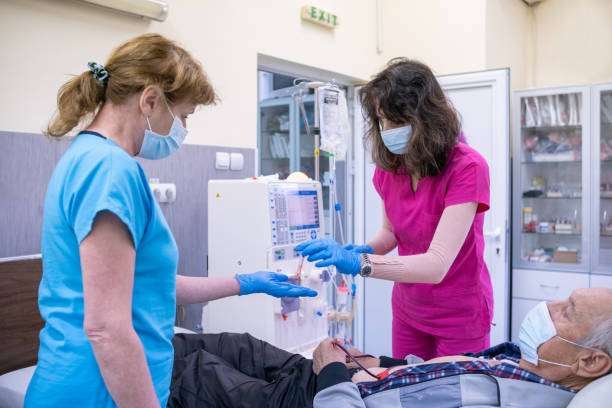
Kidney Dialysis Patients Are Prone to Anemia! A Diet High in Iron Still Requires Protein Supplementation
When the kidney function of chronic kidney disease patients enters stages 4 and 5 (end-stage renal disease), the patient’s kidney function drops to less than 15% to 30% of normal kidney function, and the patient will develop uremia symptoms. At this time, it is necessary to Consider dialysis treatment. The most well-known dialysis treatment is hemodialysis, commonly known as “kidney dialysis”. In addition to receiving kidney dialysis treatment, the patient’s living habits and diet also need to be coordinated to make the treatment more effective. Therefore, this article will introduce the details that kidney dialysis patients need to pay attention to in their diet.
Symptoms of dialysis diseases
In addition to the need for hemodialysis when kidney function reaches the fourth or fifth stages, other clinical symptoms that require kidney dialysis are as follows:
- Drug poisoning
- Acute Renal failure
- Refractory Edema
- Pulmonary Edema
- Metabolic Acidosis
- Hyperuricemia
- Hyperkalemia
- Hypercalcaemia

Principles of dietary control for renal dialysis anemia
It is very common for patients who choose kidney dialysis to develop anemia, which can cause fatigue and fatigue, as well as reduced exercise ability. Therefore, unlike other kidney patients, kidney dialysis patients need to control their anemia. There are four causes of anemia in patients:
- Shortened lifespan of red blood cells: This is the effect of urinary toxins and requires hemodialysis treatment.
- Blood loss during dialysis: About 20 c.c. of blood is lost during each dialysis. Iron supplements should be given, more iron-rich foods should be eaten, or blood transfusions should be given.
- Vitamin deficiency: Because dialysis will cause vitamin loss, vitamin B complex and folic acid must be supplemented every day.
- Decreased red blood cell production: Erythropoietin must be given because erythropoietin is reduced.
The American Nephrology Nurses Association (ANNA) recommends that dialysis patients’ hemoglobin (Hb) should be maintained at around 10 to 11gm/dl, and hematocrit (Hct) should be maintained at around 10 to 11gm/dl. Maintain 30%to 35%.
Pay attention to these things when eating blood-tonifying foods during kidney dialysis
Patients can supplement iron-rich foods and nutrients that help iron absorption and synthesis to control anemia through diet.
For iron-rich foods, you can choose red meats such as beef and salmon, as well as egg yolks, milk, shellfish, etc. It is recommended to focus on lean meat to avoid high fat and cholesterol. At the same time, you must pay attention to blood phosphorus levels.
In addition, patients can also supplement foods containing vitamin B6, vitamin B12 and folic acid to help the production of red blood cells and hemoglobin in the body, such as spinach, tomatoes, citrus, guava, lemon and other dark green, yellow and red vegetables and fruits, but these Most fruits and vegetables are high-potassium foods. It is recommended to blanch them before frying them in oil, and do not keep the vegetable soup.
Kidney patients need to supplement protein as appropriate
Some patients worry that consuming protein will aggravate their condition, so they choose not to eat protein, but this is wrong! Protein cannot be completely eliminated. Failure to decompose protein in the body will worsen the condition.
The biggest difference in diet before and after kidney dialysis is protein intake. Before kidney dialysis, protein intake will be restricted to delay the deterioration of kidney function. However, about six to eight grams of amino acids will be lost during hemodialysis, so the diet Instead, protein should be supplemented to maintain the concentration of albumin in the blood at least above 4.0g/dl, because protein is the raw material for body growth and repair, and patients with sufficient protein intake have a better prognosis. If kidney dialysis patients follow a low-protein diet, their autoimmunity will deteriorate. (Recommended reading: What are the sources of plant-based protein? 9 high-quality protein foods for you to choose from)
Generally speaking, you need to consume 1.2 grams of protein per kilogram of body weight. That is to say, if you weigh 70 kilograms, you should consume 84 grams of protein every day, and it is recommended that 2/3 come from animal proteins with high biological value, such as eggs. , fish, beef, pork, milk and poultry, etc. Be sure not to eat beans, legume products, gluten products and dried fruits. The nitrogen-containing waste after metabolism of these foods is too high and can easily aggravate uremia symptoms. Protein requirements will vary depending on the condition and the method and frequency of dialysis treatment:
- Normal person: about 1 to 5 grams per kilogram of body weight per day.
- People with poor kidney function (after the third stage of kidney disease) but not receiving dialysis: 0.6 grams per kilogram of body weight per day, less than 30 grams per day.
- Patients undergoing peritoneal dialysis: they lose a lot of protein and can be given a normal protein diet of 1 to 5 grams per kilogram of body weight per day or a high-protein diet.
- Hemodialysis patients: There is no special restriction for those who wash more than 3 times a week. As for ordinary people, the dosage is 1 to 5 grams per kilogram of body weight per day; for those who wash 1 to 2 times a week, the dosage is less than 1 gram per kilogram of body weight per day.
- If severe proteinuria is caused by diseases such as nephrotic syndrome, because protein will be lost in the urine, it is necessary to eat more protein foods with high biological value, such as 0.6 grams of animal protein per kilogram of body weight per day, plus the daily protein loss is should.












